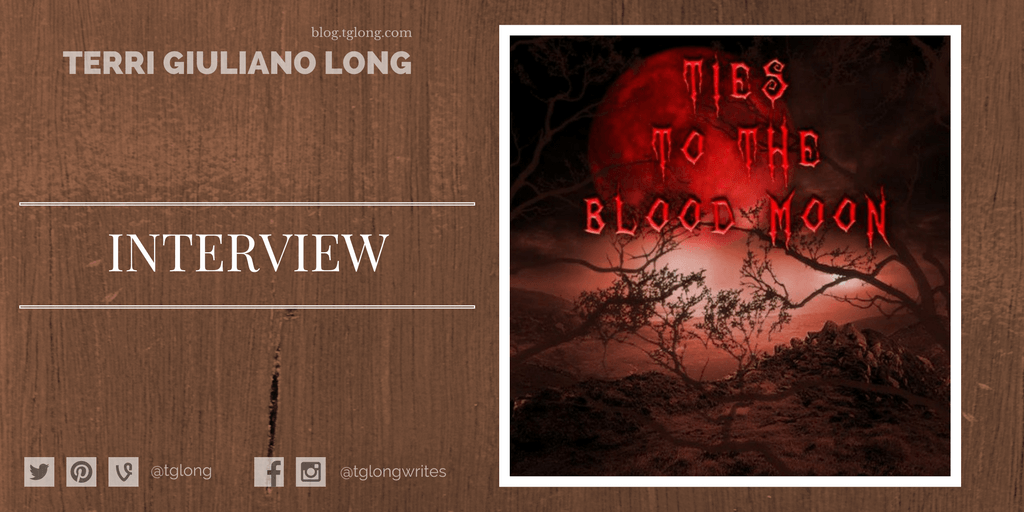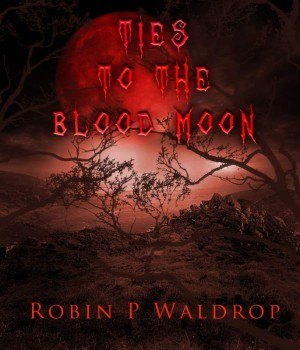I’m pleased to welcome the lovely Robin Waldrop. Robin is a new friend – I’m delighted to have met her. Robin is the author of the terrific YA/paranormal urban fantasy romance novel Ties To The Blood Moon. Robin joins us today to share the lessons she’s learned on her writing journey. Enjoy!
Guest post: Robin Waldrop
As a child, I read anything I could get my hands on and I loved writing and telling stories. As I grew older, I found less and less time to read or write. I missed these activities, but I was busy raising my children and attending to other responsibilities.
One cozy winter day, when my children were all in school, I felt consumed by the urge to read. I picked up a book a friend had given me, poured a cup of coffee, and snuck away to my my bedroom, where my husband had placed an overstuffed chair and small table in a secluded corner. This was my getaway from life, my read corner.
I could not even get through the first chapter, Completely frustrated, I flung the book across the room. The plot was terrible and the writing was even worse. The author wrote this: I do not know what happened. She come to the store and take a candy bar and places it in her purse. Notice how the author uses both past and present tense? This is only a small example of how utterly horrible the book was. What I couldn’t get out of my mind was that this book was TRADITIONALLY published!
My husband asked what was wrong. When I told him that I could write better than that garbage, he asked what I was waiting for. I just laughed. I was not a writer anymore, I told him.
That day, my husband planted a seed. The more I thought about writing, the more I wanted to try it.
Eventually, I sat down at the computer and started writing. I wrote what I loved to read-FBI suspense/thrillers. I admit, it took a few minutes to get the creative juices flowing, but once I did, the pages started to flow. The story came to a screeching halt when I realized I did not have a clue about the technical side of an FBI agent’s career. I had done no research. Nor had I written an outline or created character sheets. (Mistake # 1.) Readers tend to frown when a book seems unrealistic, even if it is fiction.
Taking my husband’s advice, I turned to the Internet. It did not go well, to say the least. I got lost in a huge mass of information, and did not know whose advice to follow.
Knowing it was important to read the sort of literature I planned on writing, I decided to search for authors who wrote in my genre. I looked at their work and biographies, and then contacted several authors whose work I admired. I told them I was new, and asked for advice. To my surprise, several were happy to oblige.
Write like the wind, edit like an architect. I received this advice from my dear friend, mentor and wonderful author, Aaron P. Lazar. When you’re writing, he told me, don’t edit as you go because no matter how many times you go back you’ll always find a word here or there to change and you will never finish the novel. He was right, too. I was doing exactly that. Every time I went back I found something else to change.
As soon as I finished the first draft, I immediately started querying agents. (Mistake # 2) I had been so eager to be the next great author that I did not take the time to edit my novel. It was full of grammatical errors. I queried more than sixty agents and all of them sent rejections. Some of the rejections were very helpful, offering advice on ways to improve my manuscript and others were, well, not helpful at all. After so many rejection letters, I felt that I had failed as an author.
I was about to give up (Mistake # 3), until I met a great friend, John Francis, also a writer, and he suggested I write some short stories and offer them for free on various sites. This would help me to build a platform. I joined several writers’ sites, met more great people, like Steve DeWinter, now another good friend, and began implementing what I had learned. I created a blog, and I found a mentor, beta readers, an editor, and almost two thousand new friends on Facebook.
Soon after, I was offered a contract with a great e-publisher, Books To Go Now, and I released my first short story Lost Hope. Now, I’ve written two full-length novels, both self-published. I love getting on Amazon or Smashwords and seeing that people are actually buying my work. Knowing people appreciate the hours, days, and months spent writing is pure bliss.
Writing has become one of the most important parts of my life. Sometimes it’s the best part,and sometimes it’s the worst. Most importantly – it has been a great learning experience.Here are the three that have stayed with me and that I consider most important:
1) Do your research:
Even when writing fiction, understanding the technical aspects of your genre is important to ensure readers believe your story.
2) Edit thoroughly before sending your completed manuscript to agents:
Authors get rejection letters every day, but the best way to ensure your manuscript will get the attention it deserves is to edit it – be sure to have other people look at your writing. We, the authors, are often too close to our work to be objective.
3) Don’t ever give up
Chances are, the first draft or even completed work will be less than ideal. Don’t give up. Write every day, even if only a journal entry or a couple hundred words in a work in progress. You will see your writing improve over time.
Oh, and one other thing: when you become successful-and you will as long as you never give up-please don’t ever forget where you came from. You will meet people along your journey who, at one time or another, are where you were at one time. Take the time to help them in some way, even if it is only giving them a little advice. In the past, I reached out to authors who started just as I had; when I wrote and asked for advice, they simply said they were too busy. I understood. But the writers who did help made a tremendous difference for me and my writing. I have made it a point to help anyone who asks. Even if it means you have to give up a few hours to help a struggling writer-do it! Who knows? You could change a launch a career!
About Robin Waldrop
Robin hails from Miami, but lives in Alabama with best friend, business partner, and husband, John. She is a mother of five, grandmother of seven, and owner of a variety of different animals.
When she’s not working at her business with her husband she’s found chained to her computer where she likes to play with all her imaginary friends.
She is an award winning-author who enjoys writing edgy YA/Urban Fantasy, and FBI suspense/thriller novels. Always a voracious reader with an unapologetic television addiction, Robin still searches for the perfect cup of coffee.
Genevieve is a teenage girl who moves in with her aunt in Alaska after the death of her mother. Soon after her arrival she learns the things she was raised to believe only existed in fairytales are in fact a big part of her history. When it gets to be too much she seeks refuge in the arms of her new boyfriend, William, only to find out he’s not who she thought he was either.




I'm a firm believer on not giving up. Definitely. Very nice article.
One thing I'd add as a fellow author–learn to format if you're self-publishing.
Nothing says amateur faster than a poorly formatted book. (and believe me, legacy publishers have some horribly formatted ones, too)
Thanks for sharing!
Thanks for the comment, Hope. Great Point. I absolutely agree 100%!
Robin P. Waldrop
Two Comments…
1) Boy, Ter..change the name and it could almost be your story!
2) EXXXAACCTTLLY!! What an incredibly positive article. I absolutely loved the tidbits of advice for budding writers.
I also wholeheartedly agree with the quality of traditional publishing house books. Sadly, I see this problem increasing versus getting better.